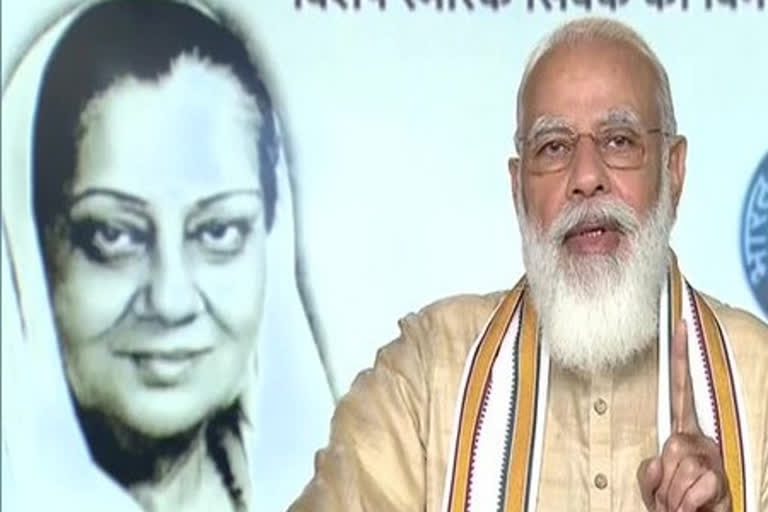Gwalior: The 100th birth anniversary of Rajmata Vijayaraje Scindia, the last Maharani of the famous Scindia royal family of Gwalior, was celebrated in grand vogue. Prime Minister Narendra Modi unveiled a 100 rupee coin in the name of Rajmata on this occasion. Speaking on the event, he said her nationalism and deep attachment to people was not concealed to anyone. Whenever the acceptability of royalty in democracy would be discussed, the name of Vijayaraje Scindia would be mentioned first.
Modi said that with the blessings of Rajmata, the country is moving forward on the path of development today.
Vijayaraje Scindia was a proficient politician
Rajmata Vijayaraje was considered a skilled politician. Rajmata, who won the Lok Sabha elections from Congress for the first time in 1957, occupied a distinguished place not only in Madhya Pradesh but across the country. After a disagreement with Congress, she joined Jan Sangh and played an important role in its foundation.
Rajmata’s political stature
Sensing a soft corner for Hinduism, the then Prime Minister Pandit Jawaharlal Nehru offered the Maharaja of Gwalior to contest on a Congress ticket. On refusing, Rajmata Scindia was persuaded to contest the election and for the first time in 1957, not only Rajmata became MP but the Congress got a landslide victory in the whole of Central India. She was elected to the Lok Sabha from Guna. She was disillusioned with the Congress and joined the Jana Sangh in 1967. With the help of Vijayaraje Scindia, the Jana Sangh became strong in the Gwalior region and despite the wave of Indira Gandhi in 1971, the Jana Sangh managed to win three seats from the region. Vijayaraje Scindia became MP from Bhind, Atal Bihari Vajpayee from Gwalior and Madhavrao Scindia, son of Vijay Raje Scindia and father of Jyotiraditya Scindia from Guna.
Rajmata considered Atal Bihari as his son
Atalji came to Gwalior when Rajmata Vijayaraje Scindia left the Congress and joined the Jana Sangh. Atal Bihari Vajpayee came to roam in Patankar market of Gwalior carrying an umbrella and some Jana Sangh workers saw him walking alone.
The news of Atal ji roaming alone by foot in Gwalior reached the palace. When Vijayaraje Scindia came to know that he was walking in the market on foot, she expressed her displeasure and asked the leaders of the party on the phone that is this your party, the biggest leader of the party is walking on the road, can not a car be arranged for him? She sent a car for Vajpayee which he returned.
Atal reached Jai Vilas Palace on foot to meet Rajmata. Rajmata said to Atal, 'You are such a big leader of the country and walking on streets'. Atal ji said- 'Does anyone ride car even inside his home? Atal ji considered Gwalior his home. After this Rajmata laughed and from that moment Atal became her religious son.
When Rajmata followed Raj Dharma, campaigned against her son
No one can forget the incident of 1984. Atal Behari Vajpayee was contesting as BJP candidate against Rajmata’s son Madhavrao Scindia and the contest for the Gwalior Lok Sabha seat was close. Rajmata then campaigned for Vajpayee. However, Vajpayee lost the 1984 election. Vajpayee laughed heartily at his defeat and said I am not sad at my defeat but at least I prevented a rebellion of a son against his mother.
Rajmata was cross with her son
Rajmata Scindia, who was in Jan Sangh and then in BJP, did not have good relations with her son Madhavrao Scindia who liked the politics of Congress better than that of BJP. Hence the mother and the son were at loggerheads. The relationship became so bitter that at one point Rajmata demanded rent from her son for living in the Jai Vilas Palace. It is a different matter that the rent was a token of Re 1. However, it reflected the deep schism between the mother and the son. In her will in 1985, she denied her son to perform her last rites on her death. However, when she died after a prolonged illness in 2001, it was Madhavrao Scindia, the son who lit her pyre.
Rajmata was born in a modest family
Rajmata Scindia was born on October 12, 1919, in the Rana family. Her father Mahendra Singh Thakur was a deputy collector of Jalaun district of Uttar Pradesh and mother was Bindeshwari Devi. Her parents used to call her by the name Divyeshwari. Vijayraje was married to Gwalior Maharaja Jivajirao Scindia on February 21, 1941, after which she lived in Gwalior. After her marriage with Maharaja Jivajirao Scindia, her name was changed to Vijayaraje.
Rajmata’s legacy continues
Rajmata's husband Jiwajirao Scindia died early. However, Vijayraje Scindia single-handedly looked after the royal estate, family and political affairs. Yashodhara Raje was carrying her legacy in the BJP and now her grandson Jyotiraditya Scindia has joined BJP, following the footsteps of his grandmother played a crucial role in toppling the Congress government in Madhya Pradesh.
Also Read: 'Triple Talaq Bill takes forward Rajmata Scindia's vision of women empowerment'


